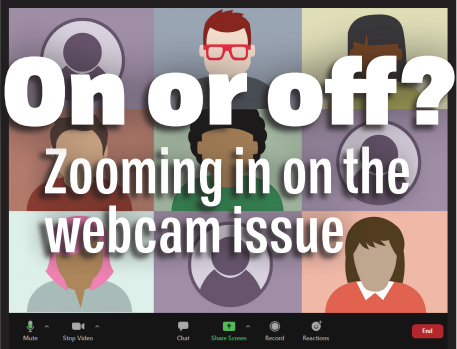
By BRIDGET ULLOA
Page Editor
The shift from having in-person classes to remote learning on Zoom has left both teachers and students with mixed feelings over whether or not students should be required to have their cameras on during Zoom lectures.
Andrea Isela Varela, a psychology major, said that she personally believed students should be required to have their cameras on even if they would be rocking that “slept in” look.
“If I am lying in bed just having my laptop next to me not having to show my face or actively participate in class, I know I am going to fall asleep,” Varela said. “Rather if I have to show my face I will prob-
ably be sitting up with my back toward the wall, looking at the camera and actively participating in class or at my desk even though I will be looking worse than any of my classmates.”
For some students having their cameras on allows for a more productive learning environment; however, for others that simply may not be the case.
Ngan Trinh, a business administration major, said that having students turn on their cameras isn’t necessarily a bad thing, but there are students who may not have the same luxuries as others.
“Turning on the camera is essentially exposing your home life to your peers and professors, which for the most part is OK, but we should take into account that some don’t have the luxuries that others do (their own room, light, etc.) and so they would be reluctant to show it,” Trinh said. “Having cameras on can actually be potentially distracting to other students as well as myself. I find myself unconsciously focusing on how I’m acting instead of paying attention to the meeting.”
Professors, just like their students, also have different views on the issue.
Amy Presley, the audio media coordinator and the audio production professor at Amarillo College, said that while she loves her students to have their cameras on, she understands that some may feel more comfortable having their cameras off.
“I understand that some students may feel insecure about their surroundings. Maybe they overslept and didn’t have a chance to brush
their hair. Or maybe their kids are in the room with them and they would prefer them not on camera,” Presley said. “There are lots of rea-
sons why students might not want to be on camera. I don’t pressure them to turn them on. They can always join when they’re ready.”
Courtney Milleson, a speech professor, said that it depends on the course that she is teaching whether she requires her students to have their camera on.
“For my upcoming eight-week interpersonal communication courses, I am requiring my students to turn on their cameras. The reason is I need them to interact with me and others as a part of learning and exploring the content,” Milleson said. “What I experienced last eight weeks was when I broke the students into groups or asked for interaction, I got nothing. Some students would not participate.”
For the most part, all professors keep their cameras on during their lectures for their students and when they see that all their students have their cameras off, some professors may feel a little bit disconnected from their class.
“I feel lonely and disconnected when students turn their cameras off,” said Jill Gibson, the chair of media, arts and communication. “I also know that when I turn my camera off in a meeting, I am more likely to text or check email and less likely to pay attention. I do understand that students deserve the right to preserve their privacy, but unless students are quarantined, they can come to campus to video conference,” Gibson said.

Leave a Reply